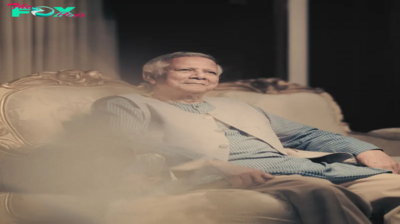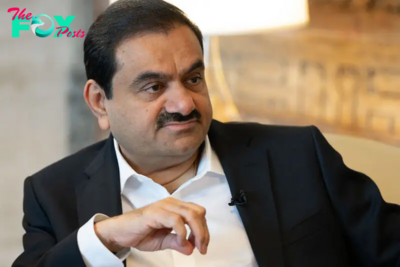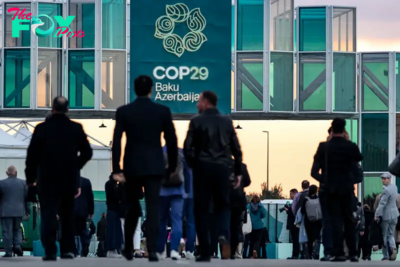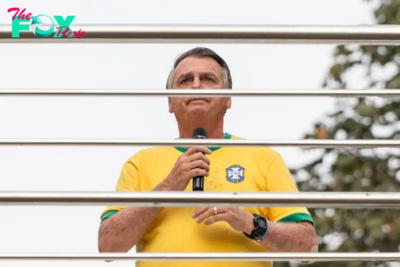World News
Switzerland’s Nemo Wins 68th Eurovision Song Contest With ‘The Code’
MALMO, Sweden — Swiss singer Nemo won the 68th Eurovision Song Contest on Saturday night with “The Code,” an operatic ode to the singer’s journey toward embracing their nongender identity.
Nemo beat Croatia’s Baby Lasagna to the title by winning the most points from a combination of national juries and viewers around the world.
The victory in the Swedish city of Malmo followed a turbulent year for the pan-continental pop contest that saw large street protests against the participation of Israel that tipped the feelgood musical celebration into a chaotic pressure cooker overshadowed by the war in Gaza.
Hours before the final, Dutch comPetitor Joost Klein was expelled from the contest over a backstage altercation that was being investigated by police.
The 68th Eurovision Song Contest finally got down to musical business Saturday in the Swedish city of Malmo after days of protests and offstage drama that have tipped the feelgood musical celebration into a chaotic pressure cooker overshadowed by the war in Gaza.
A raucous Croatian rocker, a nonbinary Swiss performer with a soaring voice and — contentiously — a young Israeli singer with a powerful ballad were among acts from 25 countries vying for the continent’s musical crown.
Before the final, thousands of pro-Palestinian demonstrators marched through Malmo to oppose the participation of Israel. Separately, Dutch contender Joost Klein was expelled from the contest over a backstage altercation that is being investigated by police.
ComPetition organizer the European Broadcasting Union said a female member of the production crew had made a complaint against the 26-year-old Dutch singer and rapper, who had been a favorite of both bookmakers and fans with his song “Europapa.”
Dutch broadcaster AVROTROS, one of dozens of public broadcasters that collectively fund and broadcast the contest, said that as Klein came offstage after Thursday’s semifinal, he was filmed without his consent and in turn made a “threatening movement” toward the camera.
The broadcaster said Klein didn’t touch the camera or the camera operator, and called his expulsion “disproportionate.”
The protests and dissent overshadowed a comPetition that has become a campy celebration of Europe's varied — and sometimes baffling — musical tastes and a forum for inclusiveness and diversity with a huge LGBT following.
The competitors performed in front of a live audience of thousands and an estimated 180 million viewers around the world. Each contestant had three minutes to meld catchy tunes and eye-popping spectacle into performances capable of winning the hearts of millions of viewers. Musical styles ranged across rock, disco, techno and rap — sometimes a mashup of more than one.
The winner will be decided by Eurovision’s famously complex system of jury and public votes, with each act hoping to escape the humiliation of getting “nul points” — zero points.
The contest returned to Sweden, home of last year’s winner, Loreen, a half-century after ABBA won Eurovision with “Waterloo” — Eurovision’s most iconic moment. ABBA did not appear in person in Malmo, though their digital “ABBA-tars” from the “ABBA Voyage” stage show did.
A trio of former Eurovision winners — Charlotte Perrelli, Carola and Conchita Wurst — came onstage to sing “Waterloo” as votes were being cast and counted.
Sweden’s entry, identical twins Marcus and Martinus, opened the comPetition with their optimistically named song “Unforgettable,” followed by Ukrainian duo alyona alyona & Jerry Heil with “Teresa & Maria,” a powerful tribute to their war-battered country.
After German balladeer Isaak and Luxembourg chanteuse Tali, Israeli singer Eden Golan took the stage to a wall of sound — boos mixed with cheers — to perform the power ballad “Hurricane.” Golan has shot up the odds table through the week, despite the protests that her appearance has drawn.
Eurovision organizers ordered a change to the original title of her song, “October Rain” — an apparent reference to the Oct. 7 Hamas attack that killed about 1,200 people in Israel and triggered the war in Gaza.
The show was typically eclectic Eurovision fare: Lithuania’s Silvester Belt was an affable young crooner, while Estonia’s 5Miinust x Puuluup offered a pop-zombie folk hybrid featuring the talharpa, a traditional stringed instrument. Greek singer Marina Satti and Armenia’s Ladaniva both merged folk song and dance elements with power pop, while Britain's Olly Alexander offered upbeat dance track “Dizzy.”
Contenders also included the goofy 1990s nostalgia of Finland’s Windows95man, who emerged from a giant onstage egg wearing very little clothing. Ireland's gothic Bambie Thug summoned a demon onstage and brought a scream coach to Malmo, while Spain’s Nebulossa boldly reclaimed a term used as a slur on women in “Zorra.”
The favorites included Swiss singer Nemo — who would be the first nonbinary Eurovision winner if the operatic song “The Code” tops the voting — and Croatia’s Baby Lasagna. His song “Rim Tim Tagi Dim” is a rollicking rock number that tackles the issue of young Croatians leaving the country in search of a better life.
Though Eurovision’s motto is “united by music,” this year’s event has proven divisive.
Tensions and nerves were palpable in the hours before the final. Several artists were absent from the Olympics-style artists’ entrance at the start of the final dress rehearsal, though all appeared at the final.
The announcers due to read the results for Norway and Finland both dropped out at the last minute, citing external events.
Powerhouse French singer Slimane cut short his ballad “Mon Amour” at the dress rehearsal to give a speech urging people to be “united by music, yes — but with love, for peace.” He did not repeat the speech during the evening final.
Several competitors made reference to peace or love at the end of their performances.
Pro-Palestinian protesters argue that Israel shouldn't be allowed to take part amid a war that has killed almost 35,000 Palestinians, according to the health ministry in the Hamas-run territory.
Thousands of people marched for the second time this week on Saturday through Sweden’s third-largest city, which has a large Muslim population, to demand a boycott of Israel and a cease-fire in the seven-month war.
A smaller group gathered outside the Malmo Arena before the final, with some shouting “shame” at arriving music fans, and facing off with police blocking their path. Climate activist Greta Thunberg was among those escorted away by police.
Loreen, last year’s Eurovision champion, said world events were “traumatizing,” but urged people not to shut down the “community of love” that is Eurovision.
“What heals trauma … Does trauma heal trauma? Does negativity heal negativity? It doesn’t work like that," she told The Associated Press. "The only thing that heals trauma for real — this is Science — is love.”
-

 World News22h ago
World News22h agoWorld’s Best Brands – Brazil
-

 World News1d ago
World News1d agoWorld’s Best Brands – India
-

 World News2d ago
World News2d agoInternational Criminal Court Issues Arrest Warrants for Netanyahu and Hamas Commander
-

 World News2d ago
World News2d agoLandmark Bill to Ban Children From Social Media Introduced in Australia’s Parliament
-

 World News2d ago
World News2d agoAmerican and Australian Tourists Die in Laos After Drinking Tainted Alcohol
-

 World News2d ago
World News2d agoSee Photos of the Seventh Volcanic Eruption on Iceland’s Reykjanes Peninsula in 12 Months
-

 World News2d ago
World News2d agoMuhammad Yunus on the Race to Build Bangladesh 2.0
-

 World News2d ago
World News2d agoU.S. Charges Indian Billionaire Gautam Adani With Defrauding Investors



















